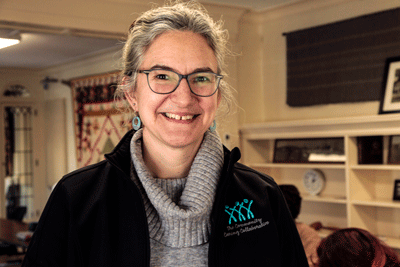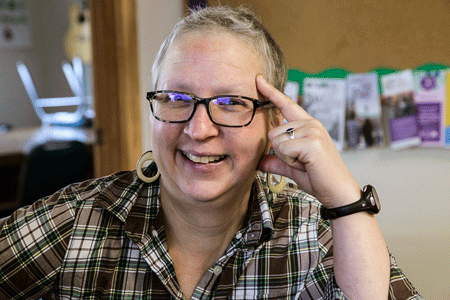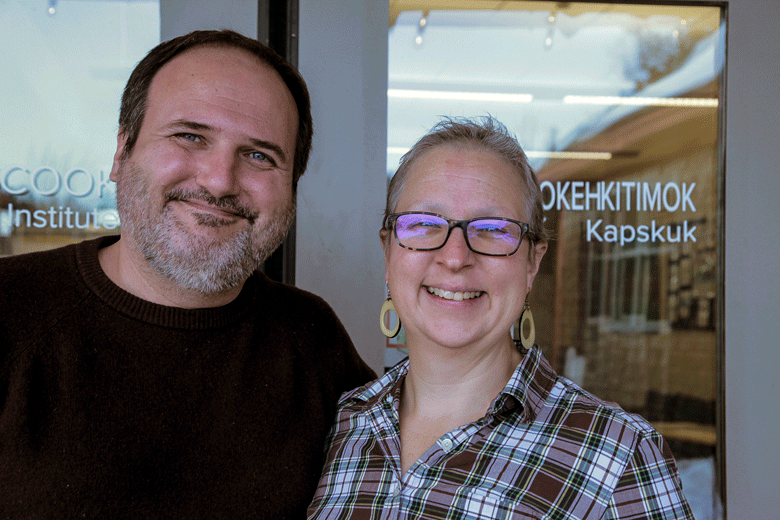
With 180 miles of seacoast and less than 13 people per square mile of land, Washington County’s assets and challenges are entwined with its geography. Fishing and other natural resource-based activities are essential to the economy, which is deeply affected by the vicissitudes of weather and a changing climate.
And relationships—person to person and organization to organization—are vitally important to ensuring people here can thrive economically and socially.
Cobscook Institute and The Community Caring Collaborative are two Washington County nonprofits that center their work on social connection and collaboration. They have very different missions yet share a commitment to enhancing quality of life in the region by building relationships that help get things done.

“I think it’s fair to say that communities that are rural have some unique challenges,” says Kara McCrimmon, one of Cobscook Institute’s three co-directors. Among the challenges she describes are geographic isolation, fewer options for jobs and social engagement, having to go further for services, fewer mental health providers, and limited access to food and transportation. Addressing these issues, she says, requires “a slow, steady building of relationships.”
Cobscook Institute (formerly Cobscook Community Learning Center), located in the coastal town of Trescott, began as a community development initiative based on educational models such as the Danish folk school, where people of all ages learn together and support each other.
“When Cobscook was founded in 1999, it was people who came together and sat in a circle and asked what we could do,” says McCrimmon. One of the to-dos was based on a request from a student who asked, “Could this new thing have a way a pregnant teen can do high school?” In response, in its sixth year Cobscook began offering a public four-year high school program in partnership with Calais High School. Cobscook’s high school incorporates outdoor activities, skill-building, and hands-on learning on the Institute’s own campus.
Cobscook’s other programs include cross-generational educational and cultural opportunities in everything from writing to birding and pottery-making to leadership development.

“Mingling among generations yields huge benefits,” says Shaun Haskins, another of Cobscook’s co-directors. “It gives kids anchors in their broader communities.” This is especially important in a region with an increasing percentage of older people. “Where kids don’t feel valued or feel like they have opportunities, they leave,” Haskins says.
Cobscook’s programming has evolved based on what people say they would like to do or learn or teach. But soliciting meaningful input is not a one-time task. “It means inviting people to share their ideas about what’s happening here, and what’s needed, again and again and again,” says McCrimmon. Achieving that is an ongoing practice and perhaps an ever-changing practice.
Machias-based The Community Caring Collaborative (CCC), with more than 45 organizational partners, approaches relationship building at the macro and micro levels. The CCC was founded in 2007 to address issues affecting at-risk infants, young children, and their families and to remove the barriers to collaboration among the agencies that serve them.
CCC’s executive director, Charley Martin-Berry, says “the mission hasn’t changed a whole lot” in the ensuing 17 years, but “the priority populations did intentionally change. We care about the lifespan. And who is at the table has evolved. It’s expanded to include more adult-serving agencies.
“In Washington County, collaboration is the name of the game. It’s bad form if you’re not collaborating,” Martin-Berry says. “It’s what we do to improve outcomes. If our partners are succeeding in their missions, we’re succeeding in ours.”
Prior to the CCC, there was fierce competition for resources among service providers in Washington County. Deb Burwell of Paddling the Rapids, who works with organizations throughout the Downeast region, notes that when funds potentially become available in an area where resources have not been plentiful, there can be a “piranha-like” response.
The CCC has fostered a more productive approach, with what Burwell describes as “a deep devotion to nurturing collaboration, the ethic of sharing what people have” and a recognition that “none of us can do this alone. It’s too complicated.”
Like Cobscook Institute, the CCC works at maintaining connections through what Martin-Berry describes as “formal, ongoing convenings.”
“Convening is so central to what we do. It’s in the air we breathe. That’s the space where partners can come together.”
The CCC Council, made up of CCC staff and directors of many of the partner agencies, meets monthly to share information, support each other’s work, and align mutual goals. The Work Group, which includes direct service workers and people they serve, also meets monthly to ensure that the CCC and other agencies are responsive to current needs.
The synthesis of organizational and individual collaboration is embodied by the Neighbor Group, which has been meeting every other Friday since 2015. Although it is supported by the CCC’s offering of meeting space, food, and gas cards, it is comprised of nonprofessionals and was instigated by a community member in response to a 2013 anti-poverty workshop.
It offers peer-to-peer opportunities to help each other and to get messages (such as, says Martin-Berry, “I can’t get a call back” or “I can’t get a job because…”) to people who can effect systems change. “They have experienced a lot of stigma, and logistical barriers too,” says Martin-Berry. “They understand the barriers. It means so much for them to give back.”
New initiatives have arisen from the Neighbor Group’s input, and Martin-Berry calls the participants “the architects of those programs.”
Central to the success the convenings and collaborations, says Martin-Berry, are authentic relationships built on trust and a willingness to be vulnerable. Or as Haskins puts it, “Relationship-building is critical. We kind of live or die based on the relationships we have, like anyone living in a rural community. Through repetition, the relationship grows.”
“I see something similar on islands,” says Burwell. “If it’s blowing a gale and you can’t get off-island, you have to depend on each other.”





